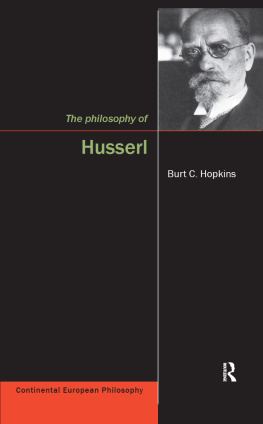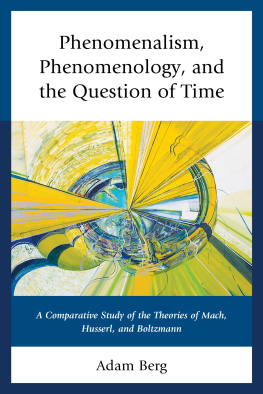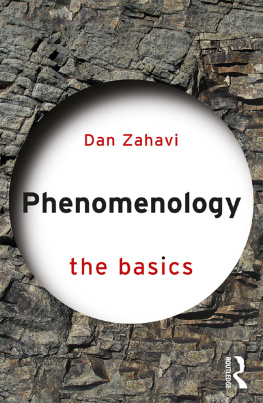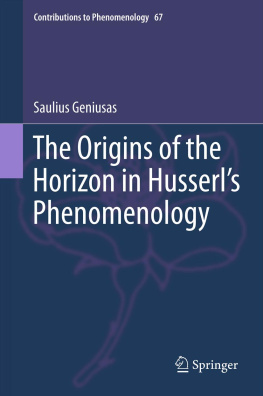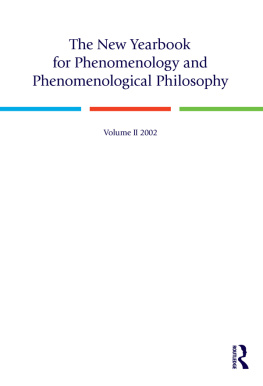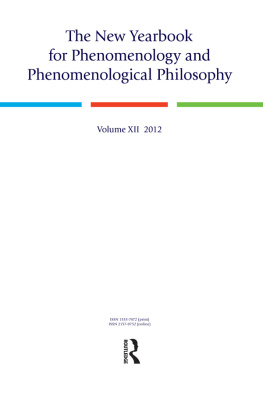
The Philosophy of Husserl
Continental European Philosophy
This series provides accessible and stimulating introductions to the ideas of continental thinkers who have shaped the fundamentals of European philosophical thought. Powerful and radical, the ideas of these philosophers have often been contested, but they remain key to understanding current philosophical thinking as well as the current direction of disciplines such as political science, literary theory, social theory, art history, and cultural studies. Each book seeks to combine clarity with depth, introducing fresh insights and wider perspectives while also providing a comprehensive survey of each thinkers philosophical ideas.
The Philosophy of Agamben
Catherine Mills
The Philosophy of Derrida
Mark Dooley and Liam Kavanagh
The Philosophy of Foucault
Todd May
The Philosophy of Gadamer
Jean Grondin
The Philosophy of Habermas
Andrew Edgar
The Philosophy of Hegel
Allen Speight
The Philosophy of Husserl
Burt C. Hopkins
The Philosophy of Kierkegaard
George Pattison
The Philosophy of Merleau-Ponty
Eric Matthews
The Philosophy of Nietzsche
Rex Welshon
The Philosophy of Schopenhauer
Dale Jacquette
The Philosophy of Husserl
Burt C. Hopkins

First Published 2011 by Acumen
Published 2014 by Routledge
2 Park Square, Milton Park, Abingdon, Oxon OX14 4RN
711 Third Avenue, New York, NY 10017, USA
Routledge is an imprint of the Taylor and Francis Group, an informa business
Burt C. Hopkins, 2011
This book is copyright under the Berne Convention.
No reproduction without permission.
All rights reserved.
All rights reserved. No part of this book may be reprinted or reproduced or utilised in any form or by any electronic, mechanical, or other means, now known or hereafter invented, including photocopying and recording, or in any information storage or retrieval system, without permission in writing from the publishers.
Notices
Practitioners and researchers must always rely on their own experience and knowledge in evaluating and using any information, methods, compounds, or experiments described herein. In using such information or methods they should be mindful of their own safety and the safety of others, including parties for whom they have a professional responsibility.
To the fullest extent of the law, neither the Publisher nor the authors, contributors, or editors, assume any liability for any injury and/or damage to persons or property as a matter of products liability, negligence or otherwise, or from any use or operation of any methods, products, instructions, or ideas contained in the material herein.
ISBN: 978-1-84465-010-1 (hardcover)
ISBN: 978-1-84465-011-8 (paperback)
British Library Cataloguing-in-Publication Data
A catalogue record for this book is available from the British Library.
Typeset in Classical Garamond.
I dedicate this book to my parents.
Contents
I would like to thank Noesis Press for kind permission to use material from Jacob Klein and the Phenomenology of History, Part I, New Yearbook for Phenomenology and Phenomenological PhilosophyI (2001), 67110.
This work owes a great deal to institutional support provided by Seattle University. I therefore thank the Office of the Provost for a Summer Faculty Fellowship that coincided with this books inception and my current Dean, David Powers, for the crucial role he played in upholding the standards of the Endowed Chair that supported its completion.
I owe a substantial debt to a number of individuals who have generously read and commented on this book in manuscript: Eva Brann, Joe Sachs, Joshua Kates, Maria Carl and Claudio Majolino.
Finally, I owe special thanks to Steven Gerrard at Acumen, without whose patience and support this book would not have been written, to Kate Williams, for her careful editing and composition of the book, and to Annie Rose Favreau and Maggie Kellogg, for their assistance in the final preparation of the manuscript.
Burt C. Hopkins
Where two page or section numbers are given, the first refers to the original edition, and the second to the English translation. Where one page number is given, it refers to the original German page number (which is printed in the English translation). Emphasis throughout is from either the original German or the English translation.
CM | Cartesianische Meditationen und Pariser Vortrge (1950)/Cartesian Meditations: An Introduction to Phenomenology (1960) |
Conversations | Adelgundis Jaegerschmid, Conversations with Edmund Husserl, 19311938 (2001) |
Crisis | Die Krisis der europischen Wissenschaften und die tranzendentale Phnomenologie: Eine Einleitung in die Phnomenologische Philosophy (1936)/The Crisis of European Sciences and Transcendental Phenomenology (1970) |
EJ | Erfahrung und Urteil ([1939] 1985)/Experience and Judgements (1973) |
FTL | Formale und Transcendentale Logik: Versuch einer Kritik der logischen Vernunft (1929)/Formal and Transcendental Logic (1969) |
Ideas I | Ideen zu einer reinen Phnomenologie und phnomenologischen Philosophie, I Buch: Allgemeine Einfhrung in die reine Phnomenologie (1913)/Ideas Pertaining to a Pure Phenomenology and to a Phenomenological Philosophy. First Book. A General Introduction to Pure Phenomenology (1982) |
ILI | Entwurf einer Vorrede zu den Logischen Untersuchungen ([1913] 1979)/Introduction to the Logical Investigations (1975) |
LI | Logische Untersuchungen (1900, 1901)/Logical Investigations (2001) |
OG | Die Frage nach dem Ursprung der Geometrie als intentionalhistorisches Problem (1939)/The Origin of Geometry (1970) |
PITC | Vorlesungen zur Phnomenologie des innern Zeitbewussteins (1928)/The Phenomenology of Internal Time Consciousness (1964) |
PRS | Philosophie als strenge Wissenschaft (191011)/Philosophy as Rigorous Science (2002) |
Introduction
Edmund Husserl (18591938) is the indisputable founder of the method of scientific research called phenomenology. Husserls phenomenology is unarguably the source of one of the two major philosophical orientations of the past century, what today goes by the name of continental philosophy. Some seventy years after his death and over a hundred years after the publication of his first major work, however, the scientific significance of phenomenological research remains a matter of dispute and its relation to philosophy, let alone continental philosophy, a matter of intense philosophical debate.
Next page
